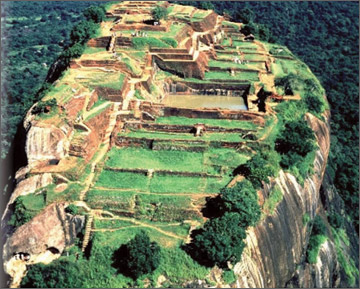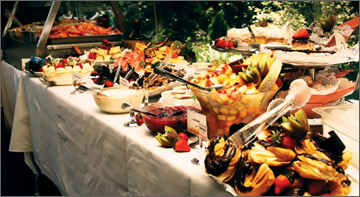A taste for science
By Dr. Sean Perera
Efforts to engage members of the public with science are sometimes
described as a smorgasbord of scientific activities. The term
smorgasbord is derived from the Swedish word for the better known Sri
Lankan concept of a buffet meal, where guests have the option of
selecting from a wide variety of different choices. Similarly, a
smorgasbord of scientific activities is intended to offer experiences
about various scientific phenomena.
 A typical smorgasbord of scientific activities may take the form of
science demonstrations, hand-on activities, talks and exhibits. A typical smorgasbord of scientific activities may take the form of
science demonstrations, hand-on activities, talks and exhibits.
A typical smorgasbord or buffet
This method of communicating science raises, however, the question of
how many non-specialist audience members will savour the favours of
science smorgasbord offerings so that they will return to taste them
again.
In a recent conference at the Australian National University in
Canberra, the term language-tasters was offered to describe current
trends among students who study language subjects at university.
Contrary to tradition, it has been found that many students now may
learn a language as a novel learning experience, without the intention
of pursuing advanced qualifications in that language.
Science tasters
I wondered, therefore, if similarly there would be science-tasters –
those people who may only wish engage limitedly with science. Thus the
smorgasbord-type feast of science shows, exhibitions and perhaps the odd
science course at university may be, in fact, as far as science-tasters
are willing to pursue scientific engagement.
While there is the potential for some science-tasters to develop a
flavour for science and return as consumers, the majority intention may
merely be to experience a taste of science. Therefore, the question
needs to be asked: What if the purpose of science communication is
incompatible with the scientific engagement requirements of
non-specialist audiences – are science engagement efforts trying to make
consumers of those who only wish to taste science?
 Members of the public engaging with science activities at a Shell
Questacon show. Members of the public engaging with science activities at a Shell
Questacon show.
Public understanding of science
To answer this question, we need to look closely at our society and
how science communication has evolved alongside social change. In the
information-rich and research-inundated society to which we belong, both
specialist and non-specialist groups are overwhelmed alike by numerous
sources of scientific information, disseminated popularly via the
internet. Despite the enormous influence and impact science has on our
daily lives, it is not feasible to expect non-specialists, or even for
that matter specialists, to be educated and well-informed about all
aspects of science. The demise of the deficit model, which emphasised
the necessity for non-specialist publics to understand science is,
therefore, reasonable.
Moreover, a technocratic approach to decision-making is overruled by
the availability and easy access to scientific information. Hence
governments are no longer able to make decisions merely based on the
advice of experts alone. Public opinion is consulted to inform national
choices in varying degrees by both post-industrial nations and their
counterparts in the process of gaining technological momentum.
 Even in Sri Lanka, the Ministry of Science and Technology and the
National Science Foundation make conscious efforts to seek public
opinion through active scientific engagement. It is clear, therefore,
that there is a universal push towards both specialist and
non-specialist public participation in national decision-making. Even in Sri Lanka, the Ministry of Science and Technology and the
National Science Foundation make conscious efforts to seek public
opinion through active scientific engagement. It is clear, therefore,
that there is a universal push towards both specialist and
non-specialist public participation in national decision-making.
Participation in science
However, we return once again to the question of how non-specialist
members of the public are able to engage in scientific decision-making,
if their intention is only to be science-tasters. To answer that
question, public engagement in science needs to be considered more
closely.
It could be said that the move toward scientifically engaging
non-specialist audiences contrast with top-down approaches in
decision-making as well as addressing the public’s scientific knowledge
deficits. However, engagement responds to the need for non-specialist
audiences to participate in science.
In my opinion, participation is not merely a matter of non-specialist
audiences willing to receive scientific information presented by
scientific specialists. More importantly, it is the act of
non-specialist audiences willingly contributing to scientific engagement
by sharing their own expertise. Likewise, scientific specialists need to
be prepared to receive from non-specialists. Participation with
reference to scientific engagement involves, therefore, both receiving
and contributing by both specialists and non- specialists.
Returning to the question of the smorgasbord-type feast of science
communication, it is clear that some non-specialists are satisfied to
participate by being science-tasters; hence they are willing only engage
limitedly with science. If this is their intent, not to engage further,
it should be respected. However, I believe that their refusal to
participate further arises from the fact that smorgasbord-type science
communication does not offer non-specialist audiences the opportunity to
contribute. While they are offered the opportunity to partake in
science, they are not given the chance to bring their own expertise to
the table. This deficiency, as I see it, is the cause for
science-tasters failing to return as consumers of science.
Science-tasters becoming consumers of science
In order to attract more science-tasters to continue to participate
and be regular consumers of science, smorgasbord-type science
communication interventions need to go beyond being a showcase, and
should invite more non-specialists audience participation through active
contribution. This would require the promotion of a shared identity for
science; one in which non-specialists identify and feel belonging. This
would require presentation of not only scientific phenomena, but more
importantly elements from everyday phenomena. In essence, the
smorgasbord-type feast needs to feature staples, familiar features, from
the non-specialists’ perspectives as well.
Some examples may include discussions about the history and
philosophy of science, or the use of commonplace materials to showcase
scientific concepts. In Sri Lanka, these efforts could take the form of
scientific discussions in the context of our Hydraulic Civilisation in
the Dry Zone or, for instance, the methods employed in traditional food
preparation. While such approaches may offer a helpful backdrop in the
form of familiar tableware to the smorgasbord, I believe the main
ingredients featured on the smorgasbord would still beckon limited
non-specialist engagement.
Sigiriya Rock Fortress
In order to encourage purposeful and effective participation of
non-specialists audiences with science, the dishes on the smorgasbord
need to be prepared by them; thus maintaining that their participation
is a familiar experience. Such an approach would serve to ensure that
non-specialist members of the public would no longer be one-time
science-tasters but regular consumers of science. Moving towards this
new paradigm of science communication is challenging, it requires
re-imaging science as an everyday human endeavour.
The author of this article, Dr Sean Perera ([email protected]),
is a Researcher at the Australian National Centre for the Public
Awareness of Science at the Australian National University in Canberra -
Australia’s premier research university. Dr Perera’s research explores
science communication issues cross-culturally. |

